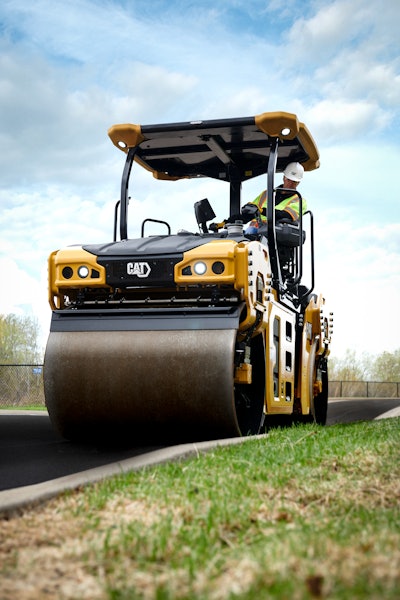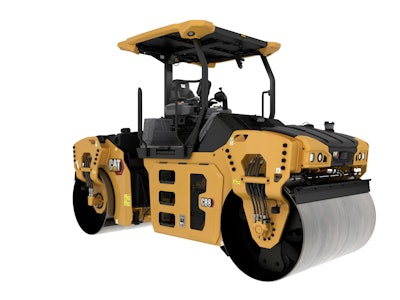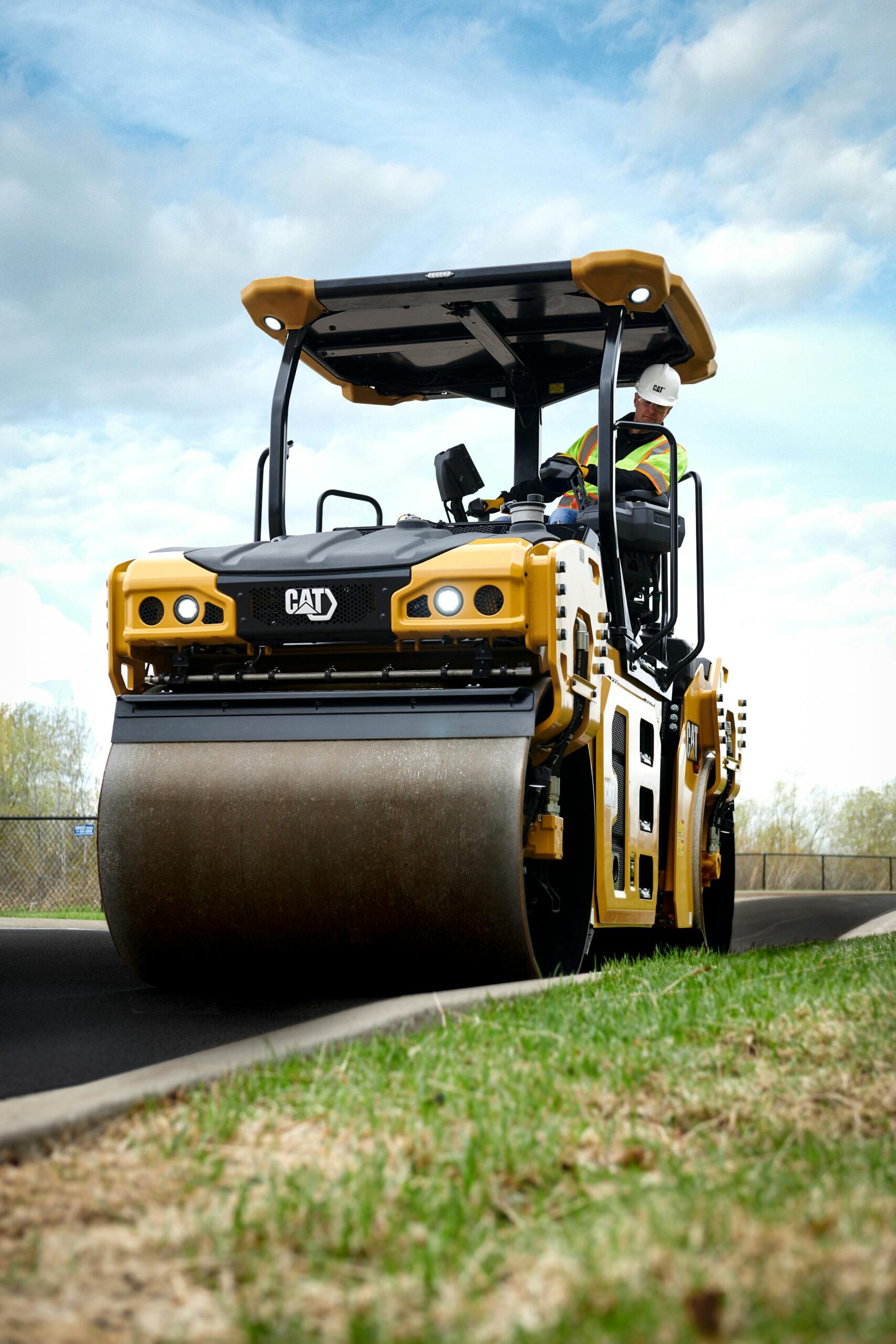Multiple new features were unveiled by Caterpillar on its CB7, CB8, and CB10 asphalt compactors at World of Asphalt 2024 in Nashville.
The updated machines have options including climate-controlled cabs, edge management, split drums, and a new mapping display.
Cab Comfort
Asphalt compaction can make or break a project, and meeting the required density and smoothness specifications can be essential to maximizing profitability. Having operators that can stay alert for longer periods to perform effective rolling patterns that cover the entire surface can be a key to success.
To improve operator productivity, one of the new features Caterpillar has added as an option on its compactors is a climate-controlled cab.
“That’s become a big a big point of contention for a lot of our customers in terms of operator retention, especially in areas where you get climate swings, such as up North where we’re dealing with cold or in the South where we’re dealing about hot,” said Cary Bryant, sales support consultant , Caterpillar. “To be able to keep an operator, especially one that’s maybe in the later years of their tenure, to keep them comfortable for an extra two or three years and keep them in your workforce is a very valuable thing.”
Features like AM/FM Bluetooth radio, climate control functions, and a heated seat combine with spacious seating and legroom, go a long way to supporting that goal.
The new mid-size compactors with cabs will also feature push-button start instead of a key. Specific codes can be assigned to each operator as an option to track who is running the machine where and when.
Another new option related to the operator station, but not specific to the cab models, is a seatbelt-use indicator.
“The way that works is there’ll be a separate beacon on top of the machine, and you can either program it to have that beacon on when the when the buckle is completed or off when the buckle is completed,” Bryant said, noting that his preference would be to not want to see any lights on unless someone is not belted in. “I don’t want to see a sea of lights and try to figure out figure out which one’s not on, I want to see no lights at all and know they’re all safe.”
Customers can pick and choose how the system is configured. Seatbelt use also can be tracked via VisionLink, Cat’s integrated full-fleet management solution for asset tracking.
Dual Split Drums
Making tight turns on hot asphalt can result in mat tearing, leading to quality issues. Cat’s solution is a dual split-drum option.
“What we do is we split the front and rear drums in half, which allows the drums to work a little bit like the differential in the car,” Bryant said. “When you make a tight turn, the outside of the drum can turn a little faster than the inside, allowing the drum to go around a tighter turning radius and not tear the asphalt.”
The dual-split drum option helps eliminate tears when maneuvering around obstacles or when compacting in applications that require frequent turning.
“It’s a feature that customers of ours appreciate when they must make a lot of tight turns, whether it’s because they’re constrained by traffic, in a downtown area and they need to make tight turning radius to get the machine turned around on a hot asphalt mat. They can do that and not damage the surface.”
 Caterpillar’s edge management system is available in either a dual or single-mount option for either providing a stable vertical face or a beveled, sloped profile for smoother transitions.Caterpillar
Caterpillar’s edge management system is available in either a dual or single-mount option for either providing a stable vertical face or a beveled, sloped profile for smoother transitions.Caterpillar
Edge-Cutting System
Proper management of unconfined edges can help optimize density and lead to better road quality. An edge-cutting system allows operators to go back after compacting an asphalt mat and refine the edge.
According to Bryant, Cat’s edge management system is available in either a dual or single-mount option. The single-edge cutter would be on the front side and the dual-edge would be fitted on both sides.
“You can put it down it works like a pizza cutter, and it’s going to cut and remove a certain amount of the outside edge of the asphalt ma,” Bryant said, noting that the vertical edge created by the cut-off wheel helps provide a stable vertical face for joint matching on the next paving pass.
“The reason you want to do that is because when you compact an asphalt mat if one of the edges is unconfined, then as you get closer to the edge of that mat, the material tends to smash out and away from the mat, leaving less density on the edge,” he said. “When you’re doing an important job where density to the edge is critical, like at an airport, for example, they’re going to require you to either cut or remove the outside six or eight inches of that mat.”
The process can be completed via a saw, an edge cutter, or another means.
“The edge cutter is a much more economical way to cut and remove that material than to have an individual with a saw cut a mile and a half worth of material off of an asphalt mat,” Bryant said, noting that the one requirement is that you must have a roller operator who can run a straight line.
The other use of the edge-cutting system is to compact and constrain.
“If you think about that same unconfined edge, instead of a pizza cutting wheel, when we first compact in that mat we’re going to put a wheel down that’s got a 45-degree bevel to it, and it’s going to marry up right to the edge of the drum and as you roll along, it’s going to prevent that material from smashing out and it’s also going to put a nice clean 45-degree angle on the edge of that asphalt mat that looks nice and sharp,” Bryant said.
The bevel edge options provide sloped profiles for smoother transitions on and off the paved surface.
Bryant said the slope helps the mat last longer and prevents it from decaying around the edge. It also assists when cars go off the edge of the asphalt to make for a smoother transition onto the mat. In some areas, it’s referred to as a safety edge.
Next-Generation Mapping
The final update on Cat’s mid-size compactors is the new mapping display that provides enhanced on-screen visuals for easier recognition and touchscreen capability for the next generation of intelligent compaction.
Using Cat Compact helps operators visualize a coverage area while monitoring pass count, temperature range to determine an overall compaction meter value or CMV. The system uses a combination of infrared temperature sensors and GPS mapping to keep operators aware of mat temperatures, machine position, pass count and layer coverage, Bryant said.
Also, the system utilizes a drum-mounted accelerometer to measure the combined stiffness of the asphalt layer, base layer, and sub-base layer to indicate road structure quality beneath the surface. Cat customers have found the technology of calculating that CMV to be valuable in covering asphalt warranties.
“One of the things you can find with the system is a soft spot in the subgrade underneath the asphalt,” Bryant said. “That would an asphalt contractor, the opportunity to go back, raise their hand to the general contractor, and say, ‘Hey, I can’t with good conscience warrant my asphalt work in this space right here because I have the data that tells me that the subgrade underneath is insufficient to support the loads that are going to be important on this mat.’”
In addition, the system manages machine to machine communication to ensure rolling patterns of multiple machines are in sync.
“Compaction is all about consistency, and the tools that we provide in terms of intelligent compaction are just the best way to track the consistency across the jobsite as far as the number of passes within a temperature and delivering a consistent result,” Bryant said.
 Cat’s CB8 compactorCaterpillar
Cat’s CB8 compactorCaterpillar
